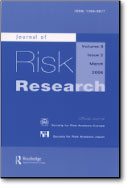Measuring Resilience

Methodological and Political Challenges of a Trend Security Concept
Autor(en): Tim Prior, Jonas Hagmann
Journaltitel: Journal of Risk Research
Serie: 3
Reviewed:
Band: 17
Seiten: 281-298
Verlag(e): Routledge
Publikationsjahr: 2014